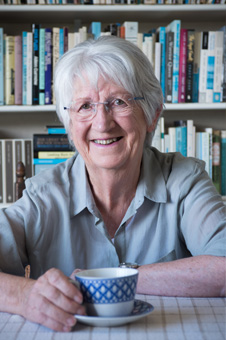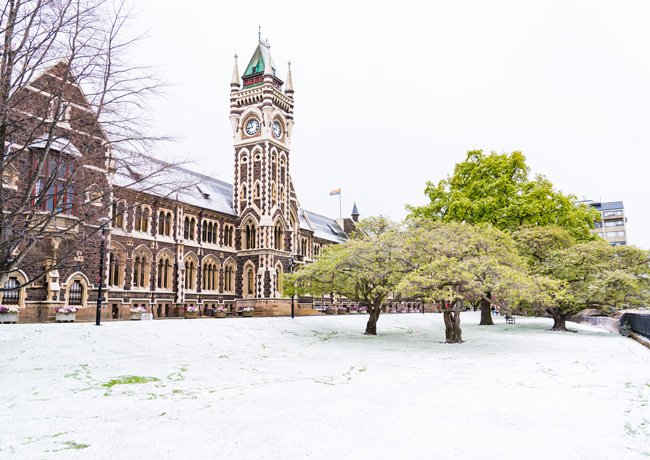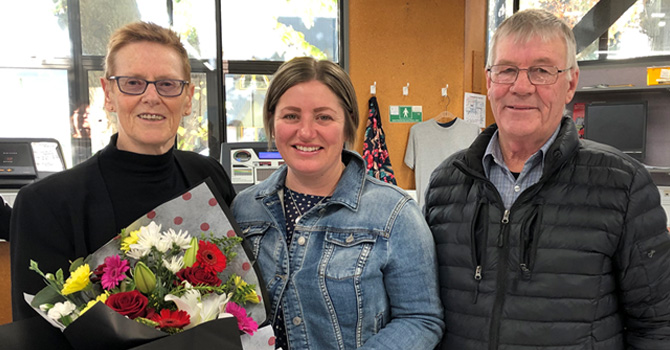Thursday 17 June 2021 9:54am
Dame Fiona Kidman DNZM OBE
The nights are long this time of year, and what better way to spend the evening than with a good book?
To help get us through the winter, we approached renowned author Dame Fiona Kidman DNZM OBE for a few “good reads” recommendations. Dame Fiona is one of Aotearoa New Zealand's most accomplished authors and is also Otago's inaugural recipient of the Centre for Irish and Scottish Studies Irish Writers Fellowship, which she will take up in Dunedin in September and October.
Here, in her own words, Dame Fiona shares some of her stand out books from the year, along with some thoughts about what, for her, makes a good read:
“Fiction is my preferred read. Give me a strong narrative arc that keeps me longing to return to a book, measuring out time until I can get back to it. If it is written with sensuous prose, silky but not overwritten, so much the better. And, if it is fact based, whether in imagined situations or real events, please let the facts be right. I have had to deal with the fallout from anachronisms too often in my early writing life not to notice them when I read the works of others now. In other words, let me believe, feed my imagination without distracting it.
These three books have given me the greatest reading pleasure this year:
Hamnet by Maggie O'Farrell (Tinder Press 2020). This Irish writer has surpassed herself in her latest novel. It's about a woman called Agnes who lives in Stratford-upon-Avon in the early sixteenth century. She has to cope with her children, with plagues, with deaths, for the most part on her own. Her husband is away in London being a famous writer and at times it is hard to keep patience with him. But their love story is so remarkable that it sustains them, even through the death of a special son called Hamnet. The man is never named, but we recognise him as William Shakespeare. The prose is stunning in what I'd describe as a most subtly feminist novel.
The main protagonist in Douglas Stuart's Shuggie Bain (Picador 2020) is also called Agnes. I put off reading this very big novel for quite a while, even though it had won the 2020 Booker Prize. The prospect of enduring the pain of the title's Shuggie Bain seemed daunting. It's the 1980s in one of the poorest parts of Glasgow and his mother, Agnes, is an alcoholic who he longs to save from herself. The prose could hardly be described as silken, rather it's tough and the dialect strong, the story as grim as it sounds. And yet, once I started, I read steadily and with growing awareness of its depth. My admiration for how Douglas Stuart has created a compelling, heart-rending, tragic, and sometimes straight out funny book is immense. The work deserves its applause.
If Stuart's work is an often thinly disguised (and subsequently acknowledged) account of experience, Charlotte Grimshaw's memoir The Mirror Book (Penguin Random House NZ 2021), is her own straight up life story. It recounts her role as part of a high-profile Aotearoa New Zealand literary family, that of C.K. Stead and his wife Kay. Grimshaw, who has written some very fine fiction of her own, explores a life that has had its fair share of difficulty. How she comes to terms with her separate identity is riveting reading. As part of the literary community, I decided in advance I must approach the work with as open mind as possible and consider it on its own terms, not as 'gossip'. It is such a beautifully written and haunting book that it totally belongs to Charlotte.”
About Dame Fiona and the Irish Writers Fellowship
Dame Fiona's writing career began in the 1960s with freelance journalism. The first of her 11 novels was published in 1979, and she has also published six short story collections and four collections of poetry. She has also written non-fiction, plays and memoir.
In 1988, Dame Fiona was made an Officer of the Order of the British Empire and became a Dame Companion of the New Zealand Order of Merit in 1998; both honours were for services to literature. She is active in the literary community, serving as president of the New Zealand Book Council from 1992 to 1995.
Dame Fiona is looking forward to living, writing and engaging with the public and alumni in Dunedin when she takes up the Irish Writers Fellowship later this year.
“I am astonished by my good fortune to be invited to take up the Irish Writers Fellowship. Being of Irish descent, I identify with the stories of how Irish people have fared in this country. It's an amazing opportunity to develop my own sense of identity and to work with the wonderful CISS team,” she says.
Her most recent novel This Mortal Boy is based on the true account of Irish immigrant Albert Black, the penultimate prisoner executed in New Zealand. The novel has won numerous prizes, including Ngaio Marsh Award for Best Crime Novel 2019, New Zealand Heritage Prize for Fiction 2018, New Zealand Booklovers Award for Fiction 2019 and Acorn Foundation Fiction Prize 2019 (Ockham New Zealand Book Awards).
Otago alumni are invited to attend 'An Interview with Dame Fiona' to be held at the University Staff Club in Dunedin on the afternoon of Sunday 26 September. To register your interest please email functions.alumni@otago.ac.nz
-
Lecture Hot Picks - @Otago 27
@Otago 27 Lecture hot picks - Otago academics, and visiting lecturers, share a wealth of information through their publi...
-
Alumni in the news
@Otago 27 - Read about Otago alumni in the news. Alumni who have recently been making headlines in the news and achievin...
-
Networks and Events galleries
@Otago 27, Networks and Events - Galleries from recent alumni events, including an inaugural alumni event at Hākitekura,...
-
Top honours for University of Otago alumni and staff
@Otago issue 27 - An inspirational group of 21 University of Otago alumni and staff received Queen’s Birthday Honours a...
-
Love, tragedy, identity - good reads from Dame Fiona Kidman
@Otago 27 - To help get us through the winter, we approached renowned author Dame Fiona Kidman DNZM OBE for a few \
-
Twins serve up some winter wellness
@Otago 27 - Their careers might be going in different directions, but Emily and Sophie Martin - aka Instagram influencer...
-
Otago Images
@Otago 27, Otago Images - We take a look back at last winter's brief, but beautiful, dusting of snow that covered the ca...
-
Sir Eion Edgar – valued friend, unwavering supporter and proud alumnus
@Otago 27, Since graduating with a BCom from Otago in 1967, Sir Eion Edgar KNZM has been a proud alumnus, valued friend...
-
Two exceptional young graduates' stories so far
O27 Your Story - Tom Devine has received the William Georgetti Scholarship and Georgia Bellett has been awarded the NZ...
-
Geology gift provides unique hands-on fieldwork opportunities
Seeing a need for students to develop their field skills, Otago Geology alumnus Clynt Nauman and his wife Jan decided to...
-
Gift acknowledges special role of breast cancer gym, and special mum
On the spur of the moment Eryn Duffy entered a radio competition for $2,000, saying if she won, she'd love to give the m...
-
Lecture Hot Picks - @Otago 27
@Otago 27 Lecture hot picks - Otago academics, and visiting lecturers, share a wealth of information through their publi...
-
Alumni in the news
@Otago 27 - Read about Otago alumni in the news. Alumni who have recently been making headlines in the news and achievin...
-
Networks and Events galleries
@Otago 27, Networks and Events - Galleries from recent alumni events, including an inaugural alumni event at Hākitekura,...
-
Top honours for University of Otago alumni and staff
@Otago issue 27 - An inspirational group of 21 University of Otago alumni and staff received Queen’s Birthday Honours a...
-
Love, tragedy, identity - good reads from Dame Fiona Kidman
@Otago 27 - To help get us through the winter, we approached renowned author Dame Fiona Kidman DNZM OBE for a few \
-
Twins serve up some winter wellness
@Otago 27 - Their careers might be going in different directions, but Emily and Sophie Martin - aka Instagram influencer...
-
Otago Images
@Otago 27, Otago Images - We take a look back at last winter's brief, but beautiful, dusting of snow that covered the ca...
-
Sir Eion Edgar – valued friend, unwavering supporter and proud alumnus
@Otago 27, Since graduating with a BCom from Otago in 1967, Sir Eion Edgar KNZM has been a proud alumnus, valued friend...
-
Two exceptional young graduates' stories so far
O27 Your Story - Tom Devine has received the William Georgetti Scholarship and Georgia Bellett has been awarded the NZ...
-
Geology gift provides unique hands-on fieldwork opportunities
Seeing a need for students to develop their field skills, Otago Geology alumnus Clynt Nauman and his wife Jan decided to...
-
Gift acknowledges special role of breast cancer gym, and special mum
On the spur of the moment Eryn Duffy entered a radio competition for $2,000, saying if she won, she'd love to give the m...
-
Lecture Hot Picks - @Otago 27
@Otago 27 Lecture hot picks - Otago academics, and visiting lecturers, share a wealth of information through their publi...
-
Alumni in the news
@Otago 27 - Read about Otago alumni in the news. Alumni who have recently been making headlines in the news and achievin...
-
Networks and Events galleries
@Otago 27, Networks and Events - Galleries from recent alumni events, including an inaugural alumni event at Hākitekura,...
-
Top honours for University of Otago alumni and staff
@Otago issue 27 - An inspirational group of 21 University of Otago alumni and staff received Queen’s Birthday Honours a...
-
Love, tragedy, identity - good reads from Dame Fiona Kidman
@Otago 27 - To help get us through the winter, we approached renowned author Dame Fiona Kidman DNZM OBE for a few \
-
Twins serve up some winter wellness
@Otago 27 - Their careers might be going in different directions, but Emily and Sophie Martin - aka Instagram influencer...
-
Otago Images
@Otago 27, Otago Images - We take a look back at last winter's brief, but beautiful, dusting of snow that covered the ca...
-
Sir Eion Edgar – valued friend, unwavering supporter and proud alumnus
@Otago 27, Since graduating with a BCom from Otago in 1967, Sir Eion Edgar KNZM has been a proud alumnus, valued friend...
-
Two exceptional young graduates' stories so far
O27 Your Story - Tom Devine has received the William Georgetti Scholarship and Georgia Bellett has been awarded the NZ...
-
Geology gift provides unique hands-on fieldwork opportunities
Seeing a need for students to develop their field skills, Otago Geology alumnus Clynt Nauman and his wife Jan decided to...
-
Gift acknowledges special role of breast cancer gym, and special mum
On the spur of the moment Eryn Duffy entered a radio competition for $2,000, saying if she won, she'd love to give the m...











